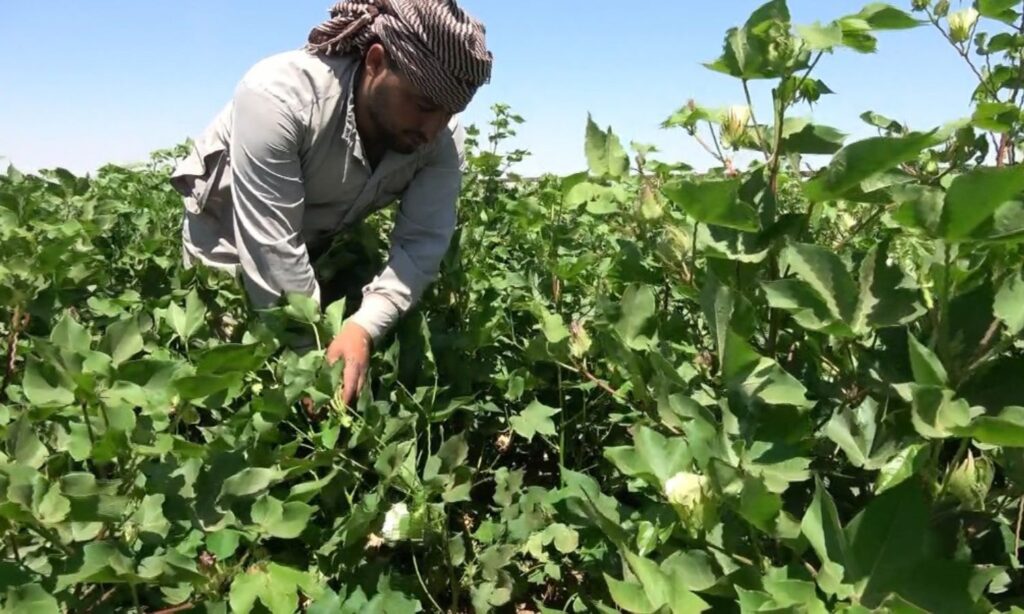While the wheat pricing announced by the Autonomous Administration of North and East Syria (AANES) a few days ago preoccupies the farmers of the region, causing them losses, others who are about to plant the cotton crop are worried about similar pricing for their crops.
The Autonomous Administration’s decision to set the price of wheat raised farmers’ concerns about adopting a similar pricing for cotton, which could also result in losses for them.
On May 25, the Autonomous Administration set the price for one kilogram of wheat at 31 US cents, knowing that the same price was 43 cents for the same quantity last year.
Fouad al-Mastour, a farmer from Jazaa village in the southern countryside of al-Hasakah, said to Enab Baladi that he reduced the area he intended to plant with cotton due to his fears about the cotton pricing. He planned to plant 50 dunams, but now he is thinking of reducing it to less than half, despite already starting plowing, weeding, and preparing the land for planting.
Al-Mastour retreated from planting his entire land area because of fears that the Autonomous Administration may not purchase the crop or buy it at a price less than its cost, in addition to the lack of outlets for draining the crop, increasing farmers’ difficulties.
Previously, the Autonomous Administration in northeastern Syria set the cotton price for 2023 at $800 per ton (about 11.7 million Syrian pounds).
The Syrian regime’s government set the purchase price for one kilogram of unpicked cotton from farmers for the 2023 season at 10,000 Syrian pounds per kilogram (10 million pounds per ton).
Reasons for decline
The reasons for the shrinking cultivated areas in the countryside of al-Hasakah, especially cotton planting, which differs from other crops requiring special supplies and conditions, include many factors, mainly the irrigation needs, which increase production costs.
Regarding the costs of planting cotton, Shavan Jalal, a farmer from Tal Ma’ruf village in northeastern al-Hasakah, explained that one dunam needs about 10 kilograms of cotton seeds, each costing around five dollars.
He added that cotton planting also requires wages for plowing and planting workers, making the cost of planting one dunam around $70, while the annual production ranges between 100 and 500 kilograms per dunam.
With the fears of the Autonomous Administration refraining from purchasing the crop, farmers face losses when selling cotton to merchants at $400 per ton, leaving them with no viable options.
Even though AANES set the cotton price at $800 per ton, it did not purchase some of the agricultural crops that local farmers offered, according to Jalal.
The official Syrian news agency (SANA) previously reported that al-Hasakah farmers completed planting their lands with cotton for the current season, with a planted area of 4,775 hectares spread across various agricultural stability zones.
Farmers in the Autonomous Administration areas have long complained of a lack of support for the cotton crop, including fuel, fertilizers, and pesticides.
An official source in the Agriculture and Irrigation Authority of the Autonomous Administration, who preferred to remain anonymous due to the lack of a “media license,” said that the authority has not provided any support for cotton so far this year. He added that last year saw the provision of enough diesel for only three waterings.
Wheat pricing led to protests
With the first days of the Autonomous Administration’s wheat pricing in its areas, local farmers protested the pricing, expressing their intention to refrain from selling crops to the administration and seeking alternatives to avoid losses.
Protests were held in villages and towns in the countryside of Deir Ezzor, Raqqa, and al-Hasakah under the administration’s control, objecting to the price set for buying wheat from farmers in their areas.
Enab Baladi‘s correspondent in Deir Ezzor reported that protest points were distributed in several towns and villages west of Deir Ezzor, including Hawayij Bo-Masa’aa, al-Saewa, and al-Hissan Roundabout, where farmers gathered in front of the Agricultural Development Company’s building to express their rejection of the proposed price.
The protests included roadblocks with burning tires in various villages and towns and are still ongoing.
Protests were not limited to Deir Ezzor alone. The local Naher Media website published pictures on May 27, claiming that dozens of farmers gathered in front of the Autonomous Administration building in Raqqa, demanding a revision of the wheat pricing set by the administration.
The protests extended to al-Hasakah governorate, where Enab Baladi‘s correspondent reported that protesters gathered in the cities of al-Darbasiyah and Amuda in northern al-Hasakah, carrying the same demands.

